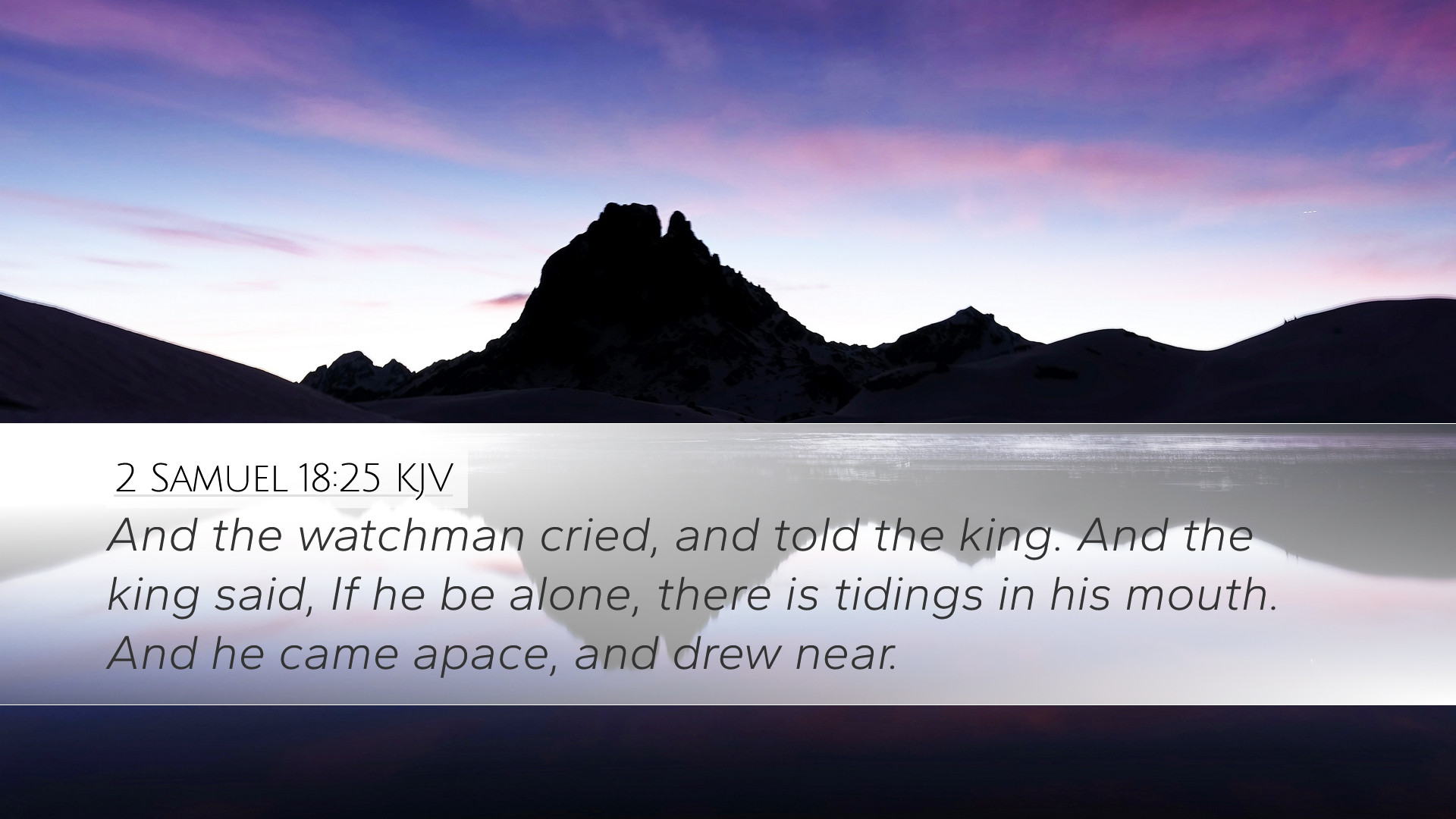Commentary on 2 Samuel 18:25
Bible Verse: 2 Samuel 18:25 (NIV) - "The watchman shouted, 'Look! The king is coming!' He said, 'If he is alone, he must have good news.'"
Introduction
This verse marks a significant moment in the narrative of David’s reign, occurring in the context of the aftermath of Absalom’s rebellion. It captures the tension that permeates the atmosphere as messengers bring news of battle. The role of the watchman is crucial, not only for the physical lookout but also as a spiritual metaphor for discernment and vigilance in times of crisis.
Contextual Framework
In 2 Samuel 18, we witness the culmination of Absalom’s revolt against his father, King David. David’s grief and the turmoil within the kingdom reflect deep personal and national crises. Understanding this verse requires an appreciation of the surrounding events, particularly the desire for a messenger who can bring tidings of either victory or defeat.
Role of the Watchman
Matthew Henry highlights the essential role of the watchman in ancient Israel as one responsible for safeguarding the city and announcing significant news. This watchman exemplifies not merely a lookout but also a herald of hope. The presence of a watchman conveys vigilance in leadership, reminding us of the spiritual watchfulness expected of leaders in the church and community.
The Significance of the King's Arrival
The anticipation of the king's arrival introduces a theme of hope intertwined with fear. The watchman's proclamation serves not just to inform but to imbue the moment with meaning. A king's presence typically signals victory and restoration, a sentiment echoed by Albert Barnes, who suggests that the expectation of news signifies the weight of the battle's outcome on the people’s spirituality and emotions.
Isolation and News of Victory
The phrase, "If he is alone, he must have good news," speaks volumes about societal perceptions of roles and expectations. Adam Clarke observes that victory is often assumed to bring a celebratory dispatch, and thus the solitary approach connotes successful news. This highlights a human tendency to equate the presence of joyful news with the absence of distress.
Spiritual Implications
From a theological perspective, 2 Samuel 18:25 prompts reflection on our own expectations of God’s intervention in crises. The isolation of the messenger and the subsequent implication of “good news” can be paralleled to Christ's solitary journey to proclaim the gospel, signaling a connection between the struggles of earthly kings and the eternal reign of Christ.
Lessons for Pastoral Leadership
Church leaders can draw lessons from this verse regarding their roles as spiritual watchmen. The responsibility to vigilantly observe and to announce the spiritual state of their communities is paramount. The anticipation of the “good news” not only motivates pastoral care but also inspires congregational hope amidst turmoil.
The Nature of God's News
Reflecting on the nature of the news that the watchman heralds, it encourages us to consider the elements of good news in our own ministries. How do we convey messages of restoration, healing, and hope to our congregations? Just as this verse highlights the anticipation of the king's return, pastors are called to cultivate expectation for the transformative work of Christ among their people.
Conclusion
2 Samuel 18:25 provides profound insights that resonate across generations of faith leaders and believers. It calls for a blend of vigilance, hope, and the articulation of good news in the midst of uncertainty. The watchman represents more than one who sees; he symbolizes the struggle of faith in waiting, watching, and ultimately witnessing the fulfillment of God’s promises. As we grapple with moments of crisis, may we remain ever vigilant, proclaiming the hope we have in the coming King.
References To Explore Further
- Matthew Henry's Commentary: A detailed exploration of the themes and implications of 2 Samuel.
- Albert Barnes' Notes: Insightful reflections on the meanings behind the actions of characters in the narrative.
- Adam Clarke's Commentary: Provides thoughtful interpretations, particularly on the expectations of messengers and news in ancient Israel.


